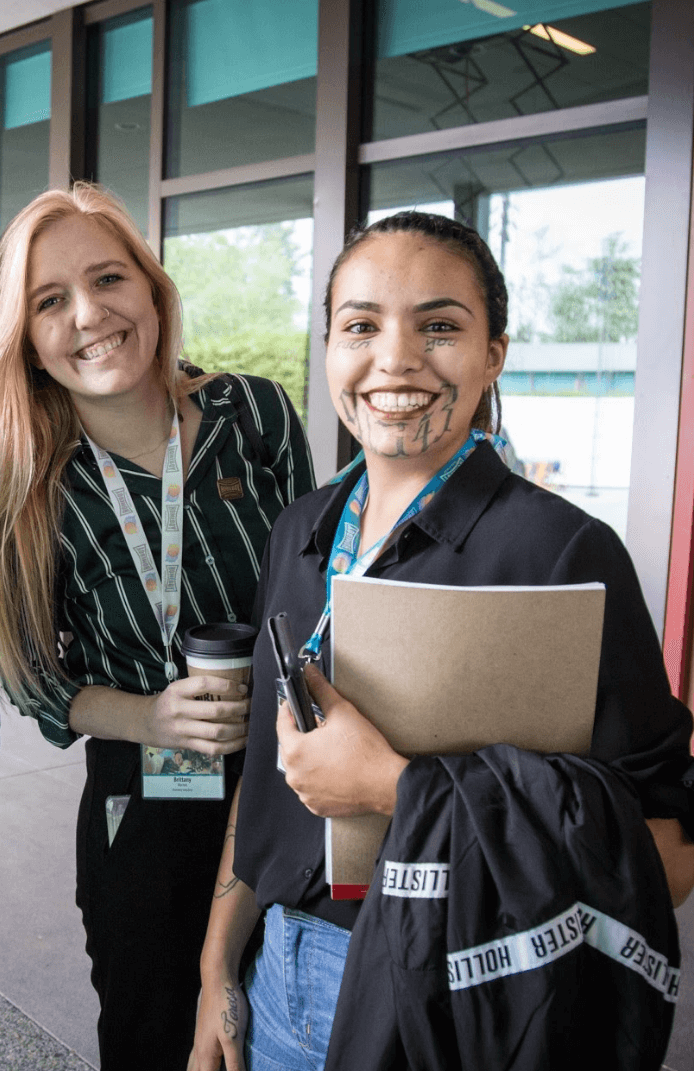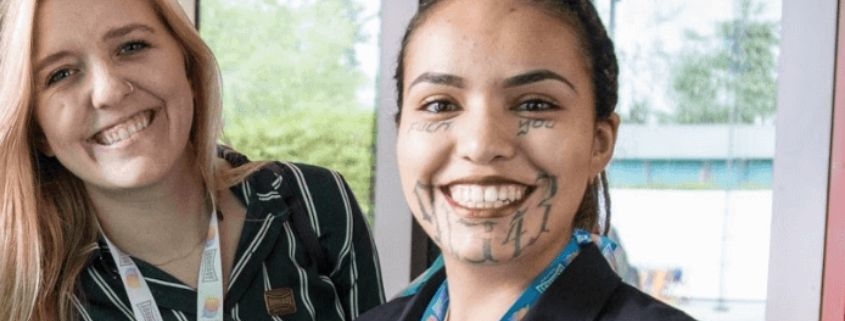“Have You Thought About School?”: Cultivating the Seed of Higher Education at Homeboy Industries
BY DANIEL SIMONDS | January 17, 2020
[Editor’s Note: This is the third in a three-part series highlighting the pursuit of higher education by members of the Homeboy Industries community, and their unique experiences and contributions in the classroom. The first installment, Homies Sit in Front: Homeboy Industries Assumes its Voice in the Classroom, can be read here. The second installment, Lived It, Studied It: Redefining Education at Homeboy Industries, can be read here.]
It was not until the self-proclaimed “street cat,” Jessi Fernandez, sauntered onto his metaphorical Platform 9 3/4 to transport from his familiar East L.A. to the Harry Potter-esque University of Oxford landscape, that Fernandez felt he was truly living, and not just surviving, looking over his shoulder. Fernandez, a trainee-intern in Homeboy’s educational services department studied abroad in 2016, and these days, Fernandez is preparing to continue his studies at UC-Berkeley in January as a transfer student, in pursuit of a bachelor’s in Sociology.

Jessi Fernandez departs for his semester abroad at the University of Oxford.
Ever the budding sociology professor, Fernandez was mindful of contrasting communication methods between Angelenos and Oxforders. Despite speaking the same language, he recalled dialect serving as a form of culture shock during one particular encounter.
“He was like, “’Ello, mate! Are you alright?’ Where I come from, that typically means one thing. Where they come from that means a different thing. I misinterpreted until I found out what it really meant and I was like, ‘Okay, he’s just being helpful and generous,” Fernandez said. While friendly for the Oxforder, a homie might interpret “Are you alright?” as confrontational.
Anthony Mondragon, a trainee, also recently seized the opportunity to gain a new global perspective. Having raised himself since he was a 15-year-old boy, left without his family, Mondragon said only the way to earn money for a meal was through theft, at times. Currently a Pasadena City College student, he would soon find himself jet-setting Europe after an Italian language course opened up an opportunity to study in Florence for the fall 2018 semester. The impetus to pick things up and live with seven roommates across the corso from Brunelleschi’s Duomo was rooted in the witness of individuals he once worked alongside at Homeboy who had studied at Oxford.

Anthony Mondragon, a trainee at Homeboy Industries and current Pasadena City College student, poses for a photo in Cinque Terre during his Italian Fall 2018 semester abroad.
When incarcerated, Mondragon recalled being frustrated but told himself, “If I get out one day, I’m going to study abroad myself.”
Mondragon would soon savor the Grand Tour of Paris, Venice, Athens, and London, among other cities, as an experience that opened his mind and ushered in a palpable sense of accomplishment, leaving the charismatic collegian with perspective.
“Stop running, walk. Take it slow. Why are you in a hurry to cross the finish line? It doesn’t matter if you’re crawling. Take time to appreciate your accomplishment,” Mondragon implored.
Evidently, Homeboy serves as the foundational rung of Maslow’s hierarchy of needs that catapults young men like Mondragon to the university experience they were destined for. Educator Jeff Duncan-Andrade illustrates the marginalized student’s uneven growth through Tupac’s poem, “The Rose that Grew from Concrete.”
“You don’t question its damaged petals. Of course, it has damaged petals, it’s growing in the concrete. Instead, you celebrate its tenacity and its will to reach the sun,” Duncan-Andrade said in his TED Talk.
Gabriel Lopez, Father Greg Boyle’s hype man at Homeboy’s enlivening morning meetings and current Cal State-L.A. student, identifies with Duncan-Andrade. As a navigator who views working with youth as his vocation, Lopez intervenes when the rose in the concrete is within bloom. It is an inviting, familial respite of kinship from the punitive encounters of misunderstanding that are all too familiar to marginalized students, predominately of color, in the K-12 system.
“Here’s the thing, homie. I’m their supervisor, but I don’t act like it. I just try to build relationships, so that when I hold them accountable, they will listen. That’s the difference between me and a teacher in public school…I’m going to tell them, ‘Make sure you come to class.’ But the way I am going to say it, they’re going to be receptive because I have a relationship with them,” Lopez said.
As an advocate for education and now also working on Homeboy’s case management team, Lami Glenn does not hesitate to ask his trainees the seminal question that Brittany Morton, academic program coordinator at Homeboy, once asked him and all of the Homeboy students featured in this article: “Have you thought about school?” Then, Glenn said, at least the seed is planted and can always be revisited.
As evidenced by the stories of those featured in this article, as well as the many others who have earned and are earning their GED or high school diploma before advancing to higher education, the seed has, indeed, been planted and is blooming. Perseverance and enlightenment spring from the program’s metaphorical waters of resilience and community cultural wealth.
Marissa Gillette, director of educational services, explained, “Once the basic needs are met, our community is able to pursue their education. . . Once out of crisis mode, they then have the capacity to thrive, not just survive.”
Securing a consistent place to live, a reliable means of transportation, sufficient nutrition, as well as managing court cases, correctional control via probation and parole, and family reunification are just some of the basic needs for which formerly incarcerated people are held responsible. But this uphill battle that the American justice system has imposed does not seem to define homies.
Instead, homies gain confidence in their newfound identity as college students, Morton said.
Glenn, for one, has brought his “educational lens” to Cal State-L.A. this fall semester, and approaches the classroom like a critic, illustrating what education has done for him.
“Are you for the death penalty? Do you believe in animal rights? Do you believe in abortion? A lot of what people say is based on emotion. ‘Oh, it’s not right.’ ‘Well, why is it not right?’ ‘Because it’s not right.’ Okay, that’s emotional. Let’s get some facts. I believe in facts. List those studies out there, reference points. So, that’s what education does: It gives you something substantial,” Glenn said.

Academic programs coordinator Brittany Morton (left) and East Los Angeles College Phi Theta Kappa Honor Society member and assistant to the CEO at Homeboy Johanna Carbajal (right) pose for a picture after presenting at the Global Homeboy Network.
Fernandez echoed Glenn’s resonance in reason. The Pasadena City College student commencement speaker for the Class of 2019 always possessed intellectual curiosity, but now he is applying it, he said.
“To have intellectual conversations aside from, ‘Oh, what were you doing last night? Who were you kicking it with? What they got going on over there? What’s that going for? I’m having intellectual conversations that spark something in my mind and it gives me growth,” Fernandez said.
Evidently, the personal benefits of furthering one’s education are worldview-informing, and richly self-developmental among Homeboy’s college community.
Assistant to the CEO, Johanna Carbajal, as a single mother, has carefully etched out time to further her education. Taking online classes with East Los Angeles College toward an associate’s degree in political science, the 3.81 GPA student has the opportunity to rewrite narratives within the carceral system as a person formerly incarcerated representing the incarcerated in a court of law.
Carbajal said, “I was always going to court when I was little, when I was in juvenile hall. I’d never thought I’d even be able to be a probation officer because I was always in trouble. But then I talked to Donna (Homeboy’s director of legal services),” who described studying law as something of which Carbajal was capable.

Inez Salcido shared academic successes with her son in 2016 as he, Daniel, graduated from Sonora High School in Alhambra, CA, and she earned her GED through Homeboy’s cohort model.
One of the primary drives for Carbajal is not only to provide adequate representation that she did not always receive but to cultivate a comfortable lifestyle for her daughter. This theme of paying it forward within one’s community was a motivator universally articulated in interviews. Glenn wants his son to have memories of his father being internally motivated to persist through college. Fernandez shared that he brought his friends and family with him during his semester at Oxford through social media, expanding their idea of what’s possible for them in the process.
Inez Salcido, a substance abuse counselor and case manager at Homeboy and East Los Angeles College psychology major, completed her general education simultaneously with her son as she earned her GED and he his high school diploma during the same graduation cycle. In this community of kinship, knowledge is shared, opportunities are passed from one to another, and an unwavering commitment to reciprocity resounds.
Dan Simonds is a second year Jesuit Volunteer who, after a year teaching at Detroit Cristo Rey High School, is continuing his westward trek from the smallest town, Warren, in the smallest state, Rhode Island. He is serving in 2018-2019 as a Student Services Coordinator at Homeboy Industries in Los Angeles, California. Dan calls Gordon College—a small Christian liberal arts college near Boston—his alma mater.









Homeboy Industries community is finding out ways and means for holistic growth and well-being of the young and upcoming. Great initiative. Nice write-up. Thanks.